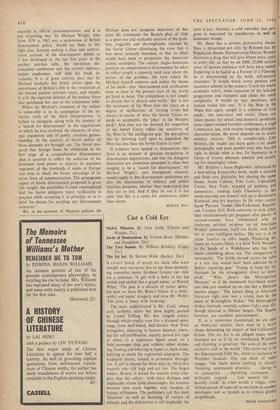Cast a Cold Eye
The Jet Set. By Burton Wohl. (Barker, 18s.) A LIVELY bunch of novels for those who want straight easy narrative, less so for those demand- ing somewhat more. Graham Greene can slide out a sentence, 'A girl with a baby in her lap smiled and smiled like a grand piano,' or Patrick White, The past is a miracle of minor saints,' but here we have Mr. Beste's `Ghost of a smile/ rabbit and snake' imagery, and even Mr. Wohl's `The joint is lousy with birdsong.'
The most sophisticated is Mr. Gold, whose cool, sardonic talent has been highly praised by Lionel Trilling. His five longish stories, through which cruelty runs like a diseased spine, range from half-baked, half-derelict New York youngsters, objecting to human decency, yearn- ing for self-justification, equally poised for rape or chess, to a nightmare figure amok on a fetid passenger ship, and soldiers, either dream- ing, feuding and whoring in Japan or, back home, bullying to death the regimental scapegoat. The scapegoat theme, indeed, is prominent through- out. A girl is shared for three days by thirty-five wastrels who talk high and act low. The Negro soldier, Brown, is baited for reasons more com- plex than his colour: with exact dialogue and implacable vision Gold disentangles the tensions between men stuck together only because of human witlessness. The publishers call this story `hilarious' as well as shocking. If torture of animals and the defenceless is still laughable, the
term is just. Anyway,-a cold reminder that pro- gress is measured by crucifixions as well as insurance stamps.
Mr. Beste has a serious, provocative theme. Man is threatened not only by H-bomb but bY Population Bomb. Humanitarian Doctor Brinton discovers a drug that will give fifteen extra years to every life, so that by AD 2000, 25,000 million years of human existence will have been added. Expecting to be hailed as a Pasteur or a Fleming, he is disconcerted by his brisk, self-assured chairman. 'It would wreck every pension and insurance scheme in the country. Crack the whole economic fabric, make nonsense of the housing programme and transport and choke the roads completely. It would be war, pestilence and famine rolled into one.' It is the Man in the White Suit again, caught in a collision of rival needs: the individual and social. There are token pauses for sexual and domestic problems, some adder-toothed business conferences, a stage Communist, but, with routine language, dialogue, characterisation, the novel depends on its docu- mentary interest. This is considerable. Like Brinton, the reader can learn quite a lot about demography and must ponder over who has the right to decide what is best for humanity in a future of leisure, pleasure, atheism and search- ing for meaningful values.
Mr. Brinkley's Jason Hightower, influenced bY a best-selling Kinsey-like book, needs a mistress and finds two, dissimilar but sharing the name Susan. Susan Culture, Free Love. Liberalism, Career, New York, scornful of jealousy and domesticity, reading Lady Chatterley to her seven-year-old son, himself well up in Baudelaire, Rimbaud, and dry martinis. In the other corner, Susan Puritan, Tender, Old-Fashioned, Republi- can, Country Girl. Both unknown to each ather, they simultaneously get pregnant after plenty of musical-comedy farce interpolated with an irrelevant satirical set-piece on an American Writers' convention, itself too facile, with little wit or even intelligent malice. The rest is in an idiom familiar to older hands. 'Flickering be- tween his Susans, Jason is a New York Wooster, in the hands of a Wodehouse who has noW learnt something about sex. The comparison is inescapable. 'The drinks moved across the table at a rate that would have been admired by 3 Bofors repeating gun.' Trying to keep his en- thusiasm for the arrangement down to fever- pitch.' "'Why, there's the Metropolitan Museum" as if the mammoth four-block struc- ture had just sneaked up on one like a Mexican hairless puppy.' The hottest thing in American literature right now was a young man by the name of Birmingham Stokes.' The Birmingham Stokes interlude remotely echoes Cakes and Ale, though directed at flimsier targets. The Susans, however, are excellent entertainment.
If, as is sometimes maintained, we are noW an American satellite, there must be a secret clause demanding the import of bad Californian fiction. The Jet Set is an alleged major novel thumped out as if by an overheated Wurlitzer and claiming to penetrate 'the aura of the most exclusive club in the world.' This turns out to be the International Café Set, about as exclusive as Wembley Stadium. One can think of ruder images. The blurb leaves nothing to chance. `Stunning, enormously dramatic . . . daring in its conception . . . shattering excitement.. • • brilliantly original . . . lush amoral life . • •
brutally frank.' In other words, a vulgar, over- written parade of types all in one form or another misshapen and so treated as to remain glumlY insignificant.
PETER VANSITIAKT


































 Previous page
Previous page